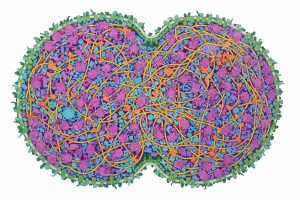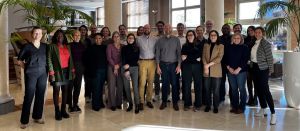
iAds: adenovirus vectors for vaccines and gene transfer
Rubén García-Martín, investigador del CNB, recibe una “Idea Semilla” de la Asociación Española contra el Cáncer
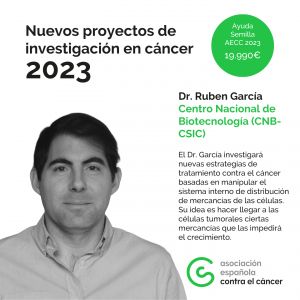
Rubén García-Martín, investigador del CNB, recibe una “Idea Semilla” de la Asociación Española contra el Cáncer
La Asociación Española Contra el Cáncer (AECC) ha celebrado el jueves 15 de febrero el acto de presentación de Ayudas AECC en Investigación 2023 que se desarrollarán en la Comunidad de Madrid.
Entre ellos se encuentra el proyecto de Rubén García-Martín, investigador del Centro Nacional de Biotecnología (CNB-CSIC), dentro de la convocatoria "Idea Semilla", que financia la generación de nuevas oportunidades innovadoras de investigación en cualquier ámbito del cáncer, que vayan a desarrollarse en España y que, en caso de éxito, puedan concretarse en proyectos sólidos de investigación.
Dotada con 20.000 euros, este proyecto presenta una gran carga innovadora, buscando nuevas estrategias de tratamiento contra el cáncer basadas en manipular el sistema intracelular de transporte de microRNAs, unas pequeñas moléculas de ARN que participan en la regulación de numerosos procesos celulares.
“A partir de pequeñas secuencias que controlan el destino de los microRNAs, diseñamos dos estrategias complementarias para frenar el crecimiento tumoral” relata García-Martín. “Por un lado, intentaremos obtener vesículas extracelulares con gran capacidad antitumoral y que frenen el crecimiento de células tumorales in vitro e in vivo; y por otro lado, buscaremos potenciar la acción de microRNAs con capacidad antiproliferativa para frenar el crecimiento del tumor a largo plazo.”
The study of synthetic cells and minimal genome, selected in the BBVA Foundation's Fundamentals Program
A new antibody manages to block all variants of SARS-CoV-2 in preclinical models
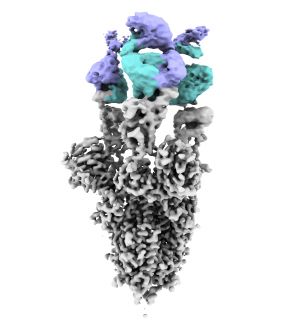
- It is a monoclonal antibody with both prophylactic and therapeutic action, isolated from blood samples of a patient infected with SARS-CoV-2 during the first wave of the pandemic.
- The antibody has been designed and developed by researchers from the National Centre for Biotechnology, Hospital del Mar Research Institute, the IrsiCaixa AIDS Research Institute, and the Center for Genomic Regulation.
- This new treatment has been patented pending commercial development. The results of the work have been published in Nature Communications journal.
A study by the National Centre for Biotechnology, belonging to the Spanish National Research Council (CNB-CSIC), Hospital del Mar Research Institute, the IrsiCaixa AIDS Research Institute –a center jointly promoted by the "la Caixa" Foundation and the Department of Health of the Government of Catalonia–, and the Protein Technologies Unit of the Center for Genomic Regulation (CRG) has led to the development of a new antibody that is active against all existing variants of SARS-CoV-2, including the Omicron subvariants currently circulating. It is a monoclonal antibody, a protein from the immune system developed in the laboratory, called 17T2. The work, in which a scientific team from the CIBER of Infectious Diseases (CIBERINFEC) also participated, has just been published by the journal Nature Communications.
Launch of ELIXIR-STEERS - enhancing research software management in life science
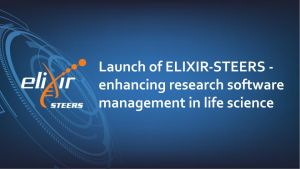
ELIXIR-ES is pleased to announce participation in ELIXIR-STEERS, a three-year EU-funded project with a total budget of €4M, which celebrates its kick-off meeting this week in Brussels (Belgium). The project is a collaboration between all ELIXIR Nodes, encompassing 36 institutes across 23 countries, plus EMBL-EBI. The Barcelona Supercomputing Center (BSC) and the Spanish National Research Council (CSIC) through the National Centre for Biotechnology (CNB-CSIC) play a relevant role in the ELIXIR-STEERS as part of the Spanish National Bioinformatics Institute (INB), the Spanish node of ELIXIR. The project aims to enhance large-scale, cross-border federated analysis in the life sciences throughout the European Research Area.
Flavivaccine: A new European project to improve global flavivirus defence with the CNB-CSIC among its partners
Luis Enjuanes, nuevo académico de número en la Real Academia de Ciencias

Luis Enjuanes, profesor de investigacion del CSIC en el CNB ha ingresado como nuevo académico de número en la Real Academia de Ciencias. Su discurso de ingreso alertó de las consecuencias para la salud de la crisis climática que vivimos: “El cambio climático afecta a la diseminación de los transmisores como las garrapatas, los mosquitos y las aves, que los trasladan a largas distancias durante los procesos migratorios.” El acto de imposición de la medalla acreditativa celebrado el 1 de febrero de 2024 fue presidido por Jesús María Sanz Serna, presidente de la Real Academia de Ciencias Exactas, Físicas y Naturales.
En su discurso, titulado “Coronavirus: evolución, patología y protección”, Enjuanes repasó la evolución de los virus que han desencadenado epidemias más graves y explicó cómo funcionan las vacunas contra el COVID-19 que se han usado en la última campaña de vacunación: “La resistencia de las variantes del COVID-19, a las distintas vacunas que se están administrando en la actualidad (2023), muestra que las vacunas de Pfizer y de Moderna están reduciendo su eficacia. Por ello, las vacunas frente al SARS-CoV-2 en producción, que se administrar durante la campaña de vacunación del 2023-2024 incluyen solamente la variante Ómicron”.
COVID PERSISTENTE
Enjuanes dedicó una parte de su discurso al COVID persistente, del que afirmó lo siguiente: “es evidente que va a representar un importante problema sanitario, social y económico, por lo que instituciones como los Institutos de Salud de Estados Unidos han dispuesto de sumas muy elevadas de financiación para su investigación. Nuestro equipo se ha sumado a este esfuerzo, y está desarrollando un proyecto sobre este tema en colaboración con equipos de investigación de este país.”
La contestación al discurso de ingreso en la RAC de Enjuanes vino de la mano de Esteban Domingo, investigador del Centro de Bilogía Molecular Severo Ochoa (CBM), quien centró su discurso en las contribuciones del científico y nuevo académico para entender los mecanismos de multiplicación de los virus y buscar estrategias para prevenir y tratar las enfermedades que producen.

Sobre la RAC
La Real Academia de Ciencias Exactas, Físicas y Naturales de España, desde sus Estatutos fundacionales aprobados por la Real Orden de 25 de febrero de 1847, tiene la tarea de fomentar el estudio y la investigación de las Ciencias Matemáticas, Físicas, Químicas, Geológicas y Biológicas, y de sus aplicaciones, así como de propagar su conocimiento. Entre sus principales funciones destaca la de asesoramiento al Gobierno en temas de su competencia, singularmente en los de política científica que puedan tener trascendencia en el desarrollo científico y tecnológico del país. Luis Enjuanes se incorpora a la academia con la medalla número 57.
Desvelan un mecanismo que garantiza la precisión durante el desarrollo de los órganos
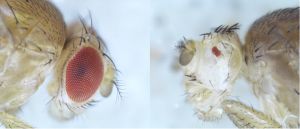
- Un estudio liderado por investigadores del CSIC identifica el mecanismo que ajusta el número de células que se diferencian para formar un órgano, asegurando el tamaño adecuado del mismo.
- El trabajo utiliza el ojo de Drosophila, la mosca del vinagre, como un "aparato óptico" biológico de referencia
Dos equipos de investigación de la conexión lifeHUB del Consejo Superior de Investigaciones Científicas (CSIC) liderados por Fernando Casares en el Centro Andaluz de Biología del Desarrollo (CABD-CSIC/UPO/JA), y por Saúl Ares en el Centro Nacional de Biotecnología (CNB-CSIC) han descubierto un mecanismo por el cuál las células indiferenciadas (células madre) que van a dar origen a los distintos tipos celulares de un órgano concreto se producen en una cantidad que se ajusta al número de células que se diferencian. De esta forma, el tamaño final del órgano tiene poca variabilidad, es decir, es consistente. El trabajo, con la participación de investigadores del Grupo Interdisciplinar de Sistemas Complejos (GISC) en la Universidad Carlos III de Madrid, y del I3S de la Universidad de Oporto, se ha publicado en la revista PLOS Biology.
Un estudio liderado por el CNB-CSIC identifica una proteína esencial en la regulación de la obesidad
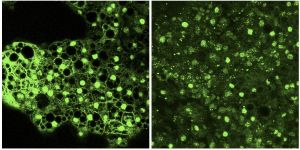
- La proteína Dido1, conocida por su papel en la diferenciación de las células madre, tiene una función clave en el desarrollo del tejido adiposo
- Este hallazgo abre nuevas vías de investigación y desarrollo de terapias dirigidas a la obesidad
La obesidad es una patología que afecta a más de mil millones de personas en el mundo y está considerada por la Organización Mundial de la Salud como una prioridad en el ámbito de la salud pública. Además, constituye un factor de riesgo para diferentes enfermedades lo que supone limitaciones en la expectativa y calidad de vida de las personas afectadas. Identificar los factores moleculares implicados es esencial de cara al desarrollo de terapias que permitan su regulación y control. Un estudio liderado por el Consejo Superior de Investigaciones Científicas (CSIC) ha descubierto que la proteína Dido1 es clave en el desarrollo del tejido adiposo y tiene capacidad de prevenir la obesidad incluso en situaciones de alimentación con dietas enriquecidas en grasas. El trabajo, que describe las funciones de Dido1 en el desarrollo del tejido adiposo, se publica en la revista Proceedings of the National Academy of Sciences (PNAS).
Mediante la generación de ratones genéticamente modificados, los autores identifican la capacidad de este gen para prevenir la obesidad. Thierry Fischer, investigador del CSIC en el Centro Nacional de Biotecnología (CNB-CSIC), da las claves del estudio. “El foco de nuestro laboratorio -señala- es el desarrollo de células madre y en los trabajos previos sobre la función de Dido1 habíamos observado que los ratones con mutaciones en el extremo amino terminal de la proteína presentaban un fenotipo diferencial: eran más delgados que los ratones silvestres”. “Por este motivo decidimos comprobar cuales eran las diferencias en su metabolismo”, continua Fischer.
Identifican el papel de la proteína SNX27 en las alteraciones inmunológicas asociadas al síndrome de Down
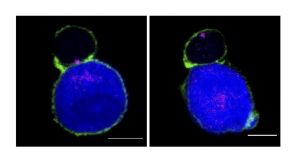
- La SNX27 es una proteína que regula el tráfico de proteínas y su deficiencia afecta las funciones cognitivas en humanos y en modelos de ratón.
- En el síndrome de Down se observa una deficiencia en los niveles de SNX27 que se ha asociado con defectos cognitivos y la aparición temprana de la enfermedad de Alzhéimer
- Investigadoras del CNB-CSIC identifican el papel de SNX27 en la inflamación y deficiencias inmunológicas empleando un nuevo modelo de ratón transgénico
La proteína Sorting Nexin 27 (SNX27) tiene un papel fundamental en el transporte de neurotransmisores en la sinapsis neuronal, y su deficiencia se relaciona con el deterioro cognitivo y el avance de la enfermedad de Alzhéimer. En el síndrome de Down se produce una reducción de los niveles de SNX27 que explica el deterioro cognitivo y el envejecimiento prematuro asociado a esta trisomía. Un nuevo trabajo de investigadoras del Centro Nacional de Biotecnología perteneciente al Consejo Superior de Investigaciones Científicas (CNB-CSIC) aporta nueva información sobre el papel de esta proteína en el control de la respuesta inmune, lo que puede ayudar a comprender las profundas disfunciones inmunológicas que afectan a los individuos con síndrome de Down.
Los resultados, publicados en la revista Immunology &Ageing, analizan las consecuencias de la pérdida parcial de SNX27 de manera específica en células del sistema inmune. Para ello, las investigadoras han generado un modelo de ratones transgénicos en el que los niveles de la proteína están reducidos únicamente en el linaje celular que produce los linfocitos T. Isabel Mérida, investigadora del CNB-CSIC detalla el porqué. “Los estudios realizados hasta ahora muestran que SNX27 es una proteína esencial, sin ella, los ratones no son viables. En los ratones transgénicos heterocigotos (solo tienen una copia del gen), se observa un fenotipo de deterioro cognitivo similar al observado en el síndrome de Down.”
COOKIES POLICY
A cookie is a text file that is stored on your computer or mobile device via a web server and only that server will be able to retrieve or read the contents of the cookie and allow the Web site remember browser preferences and navigate efficiently. Cookies make the interaction between the user and the website faster and easier.
General information
This Website uses cookies. Cookies are small text files generated by the web pages you visit, which contain the session data that can be useful later in the website. In this way this Web remembers information about your visit, which can facilitate your next visit and make the website more useful.
How do cookies?
Cookies can only store text, usually always anonymous and encrypted. No personal information is ever stored in a cookie, or can be associated with identified or identifiable person.
The data allow this website to keep your information between the pages, and also to discuss how to interact with the website. Cookies are safe because they can only store information that is put there by the browser, which is information the user entered in the browser or included in the page request. You can not run the code and can not be used to access your computer. If a website encrypts cookie data, only the website can read the information.
What types of cookies used?
The cookies used by this website can be distinguished by the following criteria:
1. Types of cookies as the entity that manages:
Depending on who the entity operating the computer or domain where cookies are sent and treat the data obtained, we can distinguish:
- Own cookies: are those that are sent to the user's terminal equipment from a computer or domain managed by the editor itself and from which provides the service requested by the user.
- Third party cookies: these are those that are sent to the user's terminal equipment from a machine or domain that is not managed by the publisher, but by another entity data is obtained through cookies.
In the event that the cookies are installed from a computer or domain managed by the editor itself but the information collected by these is managed by a third party can not be considered as party cookies.
2. Types of cookies as the length of time that remain active:
Depending on the length of time that remain active in the terminal equipment can be distinguished:
- Session cookies: cookies are a type designed to collect and store data while the user accesses a web page. Are usually used to store information that only worth preserving for the service requested by the user at any one time (eg a list of products purchased).
- Persistent cookies: cookies are a type of data which are stored in the terminal and can be accessed and treated for a period defined by the head of the cookie, and can range from a few minutes to several years.
3. Cookies types according to their purpose:
Depending on the purpose for which the data are processed through cookies, we can distinguish between:
- Technical cookies: these are those that allow the user to navigate through a web page or application platform and the use of different options or services it exist as, for example, control traffic and data communication, identify the session, access to restricted access parts, remember the elements of an order, make the buying process an order, make an application for registration or participation in an event, use security features while browsing store content for dissemination videos or sound or share content via social networks.
- Customization cookies: these are those that allow the user to access the service with some general characteristics based on a predefined set of criteria in the user terminal would eg language, the type of browser through which you access the service, the locale from which you access the service, etc.
- Analysis cookies: they are those that allow the responsible for them, monitoring and analyzing the behavior of users of the web sites that are linked. The information gathered through such cookies are used in measuring the activity of web sites, application or platform and for the profiling of user navigation of such sites, applications and platforms, in order to make improvements function data analysis how users use the service.
Management tool cookies
This Website uses Google Analytics.
Google Analytics is a free tool from Google that primarily allows website owners know how users interact with your website. Also, enable cookies in the domain of the site in which you are and uses a set of cookies called "__utma" and "__utmz" to collect information anonymously and reporting of website trends without identifying individual users..
For statistics of use of this website use cookies in order to know the level of recurrence of our visitors and more interesting content. This way we can concentrate our efforts on improving the most visited areas and make the user more easily find what they are looking for. On this site you can use the information from your visit for statistical evaluations and calculations anonymous data and to ensure the continuity of service or to make improvements to their websites. For more details, see the link below privacy policy [http://www.google.com/intl/en/policies/privacy/]
How to manage cookies on your computer: disabling and deleting cookies
All Internet browsers allow you to limit the behavior of a cookie or disable cookies within settings or browser settings. The steps for doing so are different for each browser, you can find instructions in the help menu of your browser.
If you decline the use of cookies, since it is possible thanks to the preferences menu of your browser or settings, reject, this website will continue to function properly without the use of the same.
Can you allow, block or delete cookies installed on your computer by setting your browser options installed on your computer:
- For more information about Internet Explorer click here.
- For more information on Chrome click here.
- For more information about Safari click here.
- For more information about Firefox click here.
Through your browser, you can also view the cookies that are on your computer, and delete them as you see fit. Cookies are text files, you can open and read the contents. The data within them is almost always encrypted with a numeric key corresponding to an Internet session so often has no meaning beyond the website who wrote it.
Informed consent
The use of this website on the other hand, implies that you paid your specific consent to the use of cookies, on the terms and conditions provided in this Cookies Policy, without prejudice to the measures of deactivation and removal of cookies that you can take, and mentioned in the previous section.


